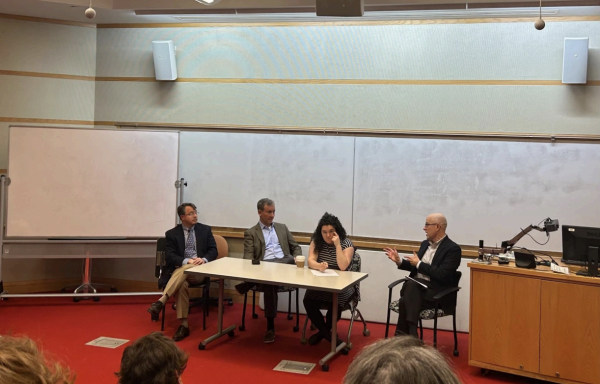
Students gathered in the Red Pit on Monday, April 7 for a discussion on increasing partisanship in the U.S. Hosted by Government Department Chair Rob Martin, the panel consisted of Professor of Government Annabelle Hutchinson, former U.S. Representative and current Professor of International Affairs Matthew Cartwright, as well as Visiting Professor of History and Executive Director of Common Ground Ty Seidule.
The event began with five-minute opening remarks from all panelists. Former representative Cartwright spoke on four separate topics relating to American partisanship: how it manifests, both in Congress and the country, how it hurts the country, whether it is worse now than before and finally, how to overcome it. Cartwright built heavily on his 12 years as a U.S. Representative, providing attendees with insight into the workings of Congress. He stressed that many Americans may not understand that the climate in Congress is far more cordial than it is portrayed as through media outlets.
Hutchinson provided a data-driven analysis of partisanship within America over the past few decades. She cited polls demonstrating that while Congress is becoming increasingly polarized, American citizens are, on average, far more moderate than their congressional representatives.
Hutchinson similarly referenced the growth in “affective polarization,” which she also described as “emotional polarization.” She stated that Americans are developing increasingly hostile views of those with different political positions. Hutchinson also observed that this increasing animosity has not been juxtaposed with a rise in favor of people’s ideological counterparts. She was quick to point out that such a trend in polarization has existed since well before the 2016 presidential campaign and the eventual election of President Donald Trump.
Offering the final opening remarks, Seidule elected to focus on partisanship “internally” and “externally.” As director of the Common Ground program at Hamilton, Seidule underscored the importance of on-campus venues for respectfully debating contentious issues. He also spoke on the need for similar programs at other institutions and projects meant to achieve similar results nationwide. Seidule was formerly Vice Chair of the Congressional Naming Commission, a committee responsible for renaming or removing Department of Defense assets commemorating Confederates. Like Professor Cartwright, Seidule incorporated his previous experience into his remarks, commenting on the partisanship and showmanship he witnessed firsthand while serving on the commission.
At this point, the conversation was opened up to the crowd. Several members of the audience shared their own experiences with politics and partisanship. Others asked questions on a wide range of topics. One inquiry centered on the structural changes that must be made to help mend the divide caused by partisanship. In response, Hutchinson emphasized the challenging reality that changes of this variety could only be accomplished by those in power, and for the time, that remains an unlikely prospect.
Reactions from the attendees seemed to be overwhelmingly positive. Charlie Kalarchian ’28 particularly enjoyed Representative Cartwright’s comments, saying, “Representative Cartwright gave many fascinating insider anecdotes on congressional examples of the hyper-partisan environment that we all see reflected so frequently.”
While some panelists held a stronger faith in the ability of Americans to make a timely fix, others appeared to believe the path forward was more challenging. Regardless of their position on this matter, there was unanimous agreement on the severity and urgency of the partisanship problem, a deeply ingrained component of American politics.